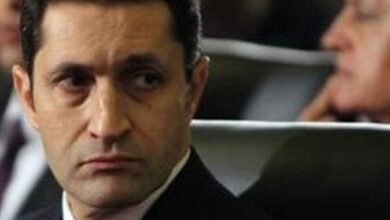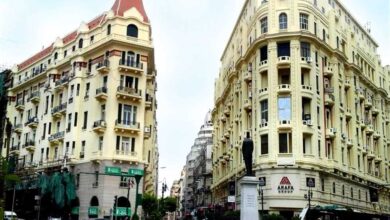Today’s newspapers all lead with Eid celebrations, alternatively describing it as the revolution’s first Eid, the first Eid without Mubarak, and the first Eid after the fall of the previous regime.
The coverage of early-morning Eid prayers is extensive, with prayers at Tahrir Square being featured most prominently, as well as Mostafa Mahmoud Square and other public spaces in Alexandria and other governorates. It is noted in several newspapers that these were the first mass Eid prayer congregations that did not require prior approval from the Religious Endowments Ministry nor the state security apparatus.
State-run Al-Ahram reports that people performed Eid prayers in Tahrir Square, led by Mazhar Shaheen, the imam of the Omar Makram mosque, which overlooks Tahrir. In his address, Shaheen praised God for the fall of Mubarak, as well as Zine al-Abidine Ben Ali and Muammar Qadhafi, hoping that other dictators in the Arab world oppressing their people will follow suit.
Al-Ahram reports that Shaheen also stated that the much-discussed "wheel of production" needed a push and called on workers from each sector to limit their individual demands. After prayers, Muslim Brotherhood member Safwat al-Hegazy asked those in attendance to depart and not remain in the square for any sort of protest.
However, members of the April 6 Youth Movement remained, chanted against the Supreme Council of the Armed Forces (SCAF), and attempted to enter the grassy island in the middle of the square, which has been manned by the Central Security Forces ever since the military forcibly ended the Tahrir sit-in on 1 August. According to Al-Ahram, they were rebuffed.
Another aspect of Eid coverage in many papers concerned how former Mubarak regime members spent the day behind bars in Tora prison. The privately owned Al-Shurouk labels it the “Sad Eid” for the residents of “Porto Tora," as it has been mockingly referred to ever since Mubarak's allies were placed there. Alaa and Gamal Mubarak were visited by their wives, while other former regime members received their families for visits.
The opposition Al-Wafd reports that the jailed officials were prohibited from performing Eid prayers due to regulations that prisoners are not allowed to leave their cells before 8 am.
On a related note, state-owned Al-Akhbar runs a picture of Syrian President Bashar al-Assad performing Eid prayers on its front page, with the caption “Bashar praying against his own people." The story goes on to explain that Syrian security forces opened fire on mosques after Eid prayers, killing seven people.
Another story receiving coverage in more than one newspaper is the pilgrimage crisis, in which Egyptians who had traveled to Saudi Arabia to perform the Umra (lesser pilgrimage) during Ramadan had been unable to return due to flight delays and congestions, and were left stranded at Jedda International Airport for days. Pilgrims who returned then protested at Cairo International Airport on Sunday, complaining of mistreatment by Saudi Arabian Airlines staff in Jedda.
Al-Akhbar reports that an end to the crisis is at hand, with Saudi Arabian Airlines agreeing to commit more planes to transport the stranded Egyptian pilgrims who number an estimated 5000.
The privately-owned Al-Tahrir newspaper gives the story front-page status, reporting that the congestion issues arising from this crisis have moved from Jedda to Cairo as the pilgrims have returned. While some of the pilgrims have returned, their luggage has not, due to weight concerns on the aircrafts. As a result, Cairo International Airport has been packed with families waiting for their luggage to arrive. Al-Tahrir also reports that 1400 Egyptian pilgrims remain in Jedda.
Calling readers back to Egypt's intriguing political scene, Al-Shorouk runs the first of a three-part interview with former International Atomic Energy Agency (IAEA) chief and presidential hopeful Mohamed ElBaradei, querying him on the state of the country six months after the ouster of Mubarak.
In the interview, ElBaradei stated that there is a difference between bringing down an entire regime and merely removing individuals.
“Credibility is eroding,” he said, “and those who carried out the revolution are now facing military trials” while Mubarak regime members are being tried in civilian courts. He also criticized the practice of ending peaceful protests with force.
The problem, ElBaradei continued, is that ongoing military trials indicate that the SCAF is dealing with the Egyptian people using the same mentality as the previous regime, which could spell the end of the revolution’s primary goals: freedom and dignity. “Democracy isn’t just freedom, but also social justice," he asserted.
ElBaradei contended that little has changed six months from Mubarak's fall, saying that the average citizen now hates the revolution. He attributed this attitude to deteriorating economic conditions in the country, even though he believes the main reason for the economic hardships is due to a lack of security.
Egypt's papers:
Al-Ahram: Daily, state-run, largest distribution in Egypt
Al-Akhbar: Daily, state-run, second to Al-Ahram in institutional size
Al-Gomhurriya: Daily, state-run
Rose al-Youssef: Daily, state-run
Al-Dostour: Daily, privately owned
Al-Shorouk: Daily, privately owned
Al-Wafd: Daily, published by the liberal Wafd Party
Youm7: Daily, privately owned
Al-Tahrir: Daily, privately owned
Sawt al-Umma: Weekly, privately owned
Al-Arabi: Weekly, published by the Arab Nasserist party




